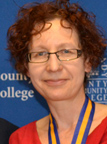Dr. Babette Faehmel
Between Classes With...
Dr. Babette Faehmel, Division of Liberal Arts
In honor of Women's History Month in March, we asked Dr. Babette Faehmel, Professor in the SUNY Schenectady Division of Liberal Arts, to share her thoughts about women's history and about those who have inspired her academically and personally.
Why is it important that we celebrate Women's History Month and the accomplishments of women?
Women's history is often times a topic that is not fully covered to the extent that it should be in an American Survey class for instance. In spite of the great strides, it also needs to be said that women are still underrepresented in corporate offices, corporate jobs. They are a tiny fraction of the members of Congress. We still are obviously fighting to maintain our reproductive rights. Women's bodies and women's issues are often turned into political issues. Women's voices are drowned out by the political establishment. Therefore it is important to highlight the historical struggles that women as a group have gone through.
How far have women come?
Equality before the law is not necessarily the only thing women need. Sometimes their differences need to be acknowledged by the law. For a woman in her '30s, the question "family or career?" still arises. For a man it is usually no question that he can have both. Women's History Month is an ideal venue to highlight these things. It should also be an occasion for celebration. Women have made great advances in the last 100 years, since the first women came together for the Seneca Falls Convention in July 1848 to draft the Declaration of Sentiments. Those women would not have dreamt that there would be a day with female firefighters or women almost equal to men in the military.
What are you covering right now in your Women's History course?
We just had a discussion on how industrialization opened up opportunities for women. But at the same time, these very jobs also turned out to be very dangerous, especially for immigrants. We have discussed the Triangle Shirtwaist Factory fire of 1911 in which more than 100 young women died, one of the greatest tragedies in New York City prior to 9/11.
Who has inspired you?
I have been inspired by strong and yet caring women who even though they were very accomplished professionals, never forgot the importance of community and the networks of other women and men who helped them become who they are. I have never been inspired by those sort of lone cowgirls who worked hard and made it far, but who weren't interested in helping other women younger succeed and help them along the path.
I've been inspired by women who in spite of their egos and ambition have not forgotten their caring side. Examples include Professor Laura Lovett, my mentor at the University of Massachusetts, and the Professors Joyce Berkmann, Kathy Peiss, and Joanne Meyerowitz who were just awesome people to work with. That said, my first academic mentor was a man who taught women's history and African American History at the University of Hamburg: Professor Norbert Finzsch. Other key male influences are Kevin Boyle, now a Professor at Ohio State University, and Daniel Horowitz at Smith College. These teachers were great because they encouraged their students to look at women and gender as important subjects of study and believed in the importance of choice! They are perfect proof that you can be a man and still be a feminist!
Parting thoughts...
Women's history is not just about some exceptional female heroines; it's mostly about changing the focus of history away from looking at areas of politics and military dominated by men, to broaden the scope of history. For instance, during the civil rights movement, women were essential trailblazers. They did daily laboring and organizing to advance the cause. They put their own bodies on the front line without getting the credit from the media, which had a tendency to focus on the male figures.
About Dr. Babette Faehmel
Dr. Faehmel teaches Women's History, American History, African American History, Western Civilization and United States Government and Politics at Schenectady County Community College. She was a 2008-2009 Five College Women's Studies Research Center Fellow at Mount Holyoke College and studied under a Social Science Research Council Grant for Sexualities Research as well. She holds a Ph.D. in American Gender History from the University of Massachusetts at Amherst, an M.A. in U.S. History from the University of Cincinnati and a B.A. in History (World) and American Studies from the University of Hamburg. In addition to Schenectady County Community College, she has taught at Smith College, The University of Cincinnati and the University of Massachusetts. She has been a member of the faculty in the SUNY Schenectady Division of Liberal Arts since September 2009. She is the author of College Women In the Nuclear Age: Cultural Literacy and Female Identity, 1940-1960.
